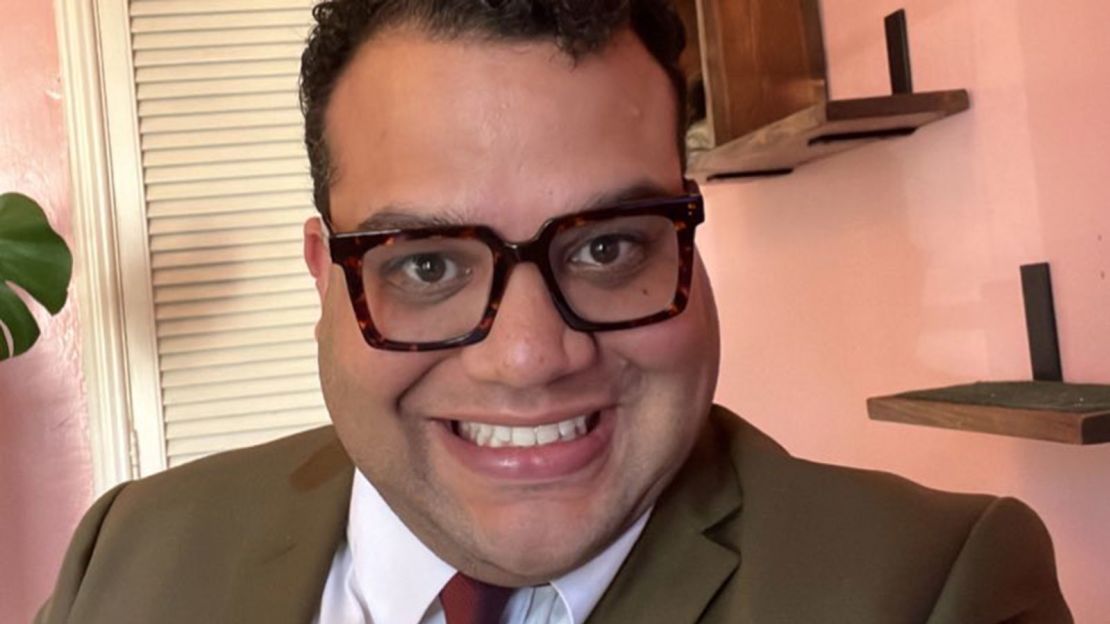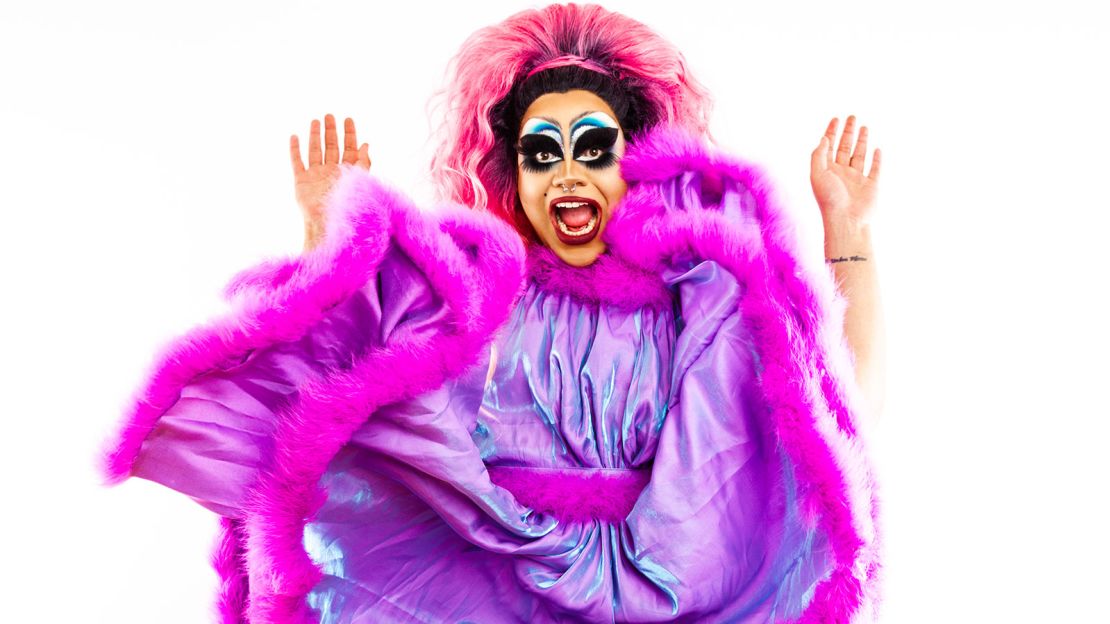The stage was set at Le Poisson Rouge, a nightclub in New York City, as part of the monthly “Nightgowns” drag showcase run by performer and “RuPaul’s Drag Race” winner Sasha Velour. After a short montage of news clips discussing the many controversies surrounding him, the embattled New York Rep. George Santos made his entrance. Sort of. Rather, the Los Angeles-based drag queen Meatball made her entrance, dressed as Santos.

Performing a camp classic from the film, “The Greatest Showman,” she transformed from Santos’ slacks-and-sweater Congress attire (in drag, this is known as a “reveal”) into a replica of the sparkling red gown he’d worn during his own dabbles with drag as a young man in Rio de Janeiro, replete with the feather boa and cheap wig.
That was perhaps the toughest part, Meatball explained in an interview with CNN Opinion, because after all, “a drag queen’s worst nightmare is a flat wig.”
Beyond the emotive lip-sync — which yielded an incredible response from the audience, and has since gone viral across social media — Meatball’s act hit all-too-neatly at the intersection of a number of current “culture wars.” The borderline-campy spectacle that surrounds Santos, yes, but also the politics; specifically the fear-mongering and rhetoric targeting LGBTQ people and communities which has, in recent years in particular, led to a drastic rise in anti-trans and anti-drag legislation. Last week, Tennessee became the first US state (though almost certainly not the last) to restrict drag shows and performances.
“The current climate’s a mess,” Meatball told me in a discussion over the state of drag in this moment. “I just don’t understand what drag has to do with any of this… In the last few weeks, I’ve seen (reports of) people arrested for assaulting children; not a single one of them was a drag queen. They were preachers and teachers and youth leaders. Why are you so obsessed with trans people and drag people? The problem is at your door. This is something that, in the last few years, has been turned into an issue that never existed. It’s never been with us.”
This interview has been edited and condensed.
CNN: When was the first time you encountered drag, or felt the urge to perform?
Meatball: When I was a kid, my mom had cancer. So she had a bunch of human hair wigs, and she did say I would put the wigs on a lot. She was like, “You put them on a little too much. You were having too much fun.”
But I wasn’t playing with makeup or drag in high school and college — it just wasn’t something I thought about. I didn’t start performing until after I’d moved to Los Angeles as an adult. I’d always wanted to be a stand-up comedian; I went to drag shows here and immediately connected with them because it was the first time I’d seen drag queens telling jokes. And then there was a season of “RuPaul’s Drag Race” with this queen named Latrice Royale. She blew my mind — as a bigger girl, she was doing splits, death drops and all these tricks. She was hilarious. She was 100% herself. I was like, oh, this is something I think I’ve been interacting with for years. But I’d never seen myself in it until that moment.
My first drag show, I performed Whitney Houston’s “It’s Not Right but It’s Okay.” I was wearing a solid gold kaftan that did not breathe, so I was very sweaty. I was absolutely terrified to be on stage. But I slayed. I don’t want to toot my own horn, but I absolutely ate it up. All of my friends in that moment were like, you have found your calling. Seven years later, it’s my full-time job.
You’ve received a ton of attention in recent weeks for one particular performance. How did your “George Santos drag” come about?
Meatball: I saw the photo of him in drag the day that story broke. I have a podcast called “Sloppy Seconds with Big Dipper and Meatball” and the minute the news came out, I was like, oh, we have to get Marisa Kabas on — she’s the journalist who first got the photo.
As a joke, I dressed up like him for the interview, and she said to me, “It’s so uncanny, it’s hard to look at you.” A friend messaged me after like, “You need to turn George Santos into your new personality.” I made a couple of TikToks, but I’m an old man so they flopped.

But, I don’t know, there was something in me that knew there was something else for me to do. So I said to myself, I’ve got to do a George Santos number.
Now, the backstory behind “This Is Me” — which is the song I’m lip-syncing — is that it’s a total drag cliché. It’s so overplayed; every time someone performs it, they wipe their makeup off and take their wig off and it’s a big proclamation of, well, this is me. Everyone hates it.
But I thought, okay, if George Santos was going to finally do drag again, this is what he would do. He would pick the worst song. Everything kind of fell into place after that. The energy in the room that night — I’ve been doing drag shows for seven years, and I’ve never felt that before. Someone commented on one of the videos that they felt like they were a part of drag history.
Why do you think there’s been such a particular fascination with this part of Santos’ background — and what do you think it says about this moment in culture?
Meatball: He did look kind of bad, you know what I mean? You’ve got to admit it wasn’t the best look. But I mean, it was his first time. Give him a couple more tries, maybe we’ll see what happens.
Look, drag is extremely controversial right now and Santos sits in Congress (at a time when) lawmakers are literally trying to ban drag shows. So for him to have taken part in drag — in a way that looks like he was a little bit more committed than he’s willing to admit — really sticks with people. I’m sure he was just having a good time, like he said. So there it is: you had fun. You weren’t trying to hurt anybody. You weren’t aiming to groom anybody.
What is the impact of this political climate — with such a drastic rise in anti-drag and anti-trans rhetoric — on your community?
Meatball: It’s an extremely scary situation we’re in. A lot of things are being used against drag queens, queer people and the LGBTQ community — we’re being villainized in a way that is almost obsessive. There’s a real level of danger we have to work under, just touching on incidents like the Pulse shooting, or the shooting at Club Q in Colorado Springs last year. Gay clubs are literally investing in things like bulletproof shields behind the bar.
I threw a party in Austin, Texas, at a venue last December which got calls making threats — we had to have plainclothes police in the audience to make everyone comfortable in the environment. We have heightened security at our venues in Los Angeles now. But I can’t stop what I’m doing just because there’s a little bit of fear.
A gay bar is like church, you know what I mean? It’s where we go to feel comfortable in ourselves. There’s a need to get back to that; you don’t go for a couple of weeks and then you realize, I need to be around my people, I need to be who I am. There’s a stronger sense of community. I know people here in Los Angeles who want to go to Tennessee and perform at Play Dance Bar in Nashville because of the laws passed there. There’s a sense of like, we can’t be defeated by this.
But I do fear for what queer nightlife will become. And I fear for what elementary and high schools are becoming, with book bans and all that. Are we going to start burning books again? What is happening? Keep in mind that some of these laws aimed directly at the LGBTQ community are just the beginning. What’s behind it? What are you really trying to get at? Because I don’t think a man in a wig is the real issue here.
A focus in particular of right-wing legislators and activists has been the argument that drag — and LGBTQ culture more broadly — is innately inappropriate for children. What do you think they are getting wrong?
Meatball: Look, every show that I do is 21 and up. Every social media account that I have is set to restrict viewers who are below the age of 18 — or at least say they are. I’m doing everything in my power, and every drag queen I know is doing everything in their power, to make sure we aren’t performing in front of children. I’m not having kids at my shows, period. My old day job was as a nanny; when I was nannying, the kids didn’t know I was a drag queen. The parents did. Some of them would even let me get into makeup at their houses after putting their kids to sleep.

But that doesn’t make it wrong. If you look at what queens are doing at drag story hours, they’re not performing numbers or acts — they are reading books. To me it’s comparable to, say, having a clown come in and read. I mean, look at me. I’m a clown! And that’s not to say that a drag queen can’t do a number in her bra and panties at a 21-and-up event at a bar one night and then go the next day and dress up like a housewife to read to children, but these articles or these Instagram posts will take video of a queen doing a club performance and use that footage to say, your kids are seeing this. I don’t know many parents bringing their children to a club.
What do you see as the impact of these bans and restrictions on young people, and queer people who are already often marginalized?
Get our free weekly newsletter
- Sign up for CNN Opinion’s newsletter.
- Join us on Twitter and Facebook
Meatball: It’s about placing restrictions on an art form that’s existed for many, many years. If a high schooler sees “RuPaul’s Drag Race” and thinks, oh, I want to start playing in makeup, there shouldn’t be anything wrong with that. There isn’t anything wrong with that. There should be a way for them, at the right age, to engage with drag in a way that is fully appropriate — in a safe space like drag bingo, a daytime brunch or another all-ages event.
Wouldn’t you, as a loving parent, want your child to come to you with everything instead of trying to hide from you? Because the more you ban stuff, the more they’re going to want to do it on their own.







